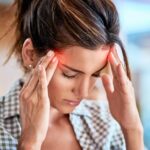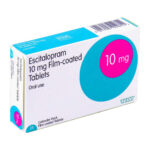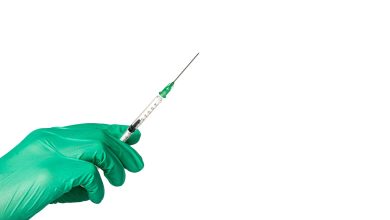How Do You Manage Escitalopram Side Effects?

A side effect is usually regarded as an undesirable secondary effect which occurs in addition to the desired therapeutic effect of a drug or medication. Side effects may vary for each individual depending on the person’s disease state, age, weight, gender, ethnicity and general health.
Side effects can occur when commencing, decreasing/increasing dosages, or ending a drug or medication regimen. Side effects may also lead to non-compliance with prescribed treatment. When side effects of a drug or medication are severe, the dosage may be adjusted or a second medication may be prescribed. Lifestyle or dietary changes may also help to minimize side effects.
What is Escitalopram and How does work?
Escitalopram belongs to the group of medications called selective serotonin reuptake inhibitors (SSRIs). It is used to treat depression, obsessive-compulsive disorder (OCD), and generalized anxiety disorder (GAD). It works by increasing levels of a neurotransmitter called serotonin in the brain. Increased serotonin levels can lead to an improved mood.
The medication usually begins to work within 2 to 4 weeks. However, it may take several weeks of treatment before the full effects are seen.
This medication may be available under multiple brand names and/or in several different forms. Any specific brand name of this medication may not be available in all of the forms or approved for all of the conditions discussed here. As well, some forms of this medication may not be used for all of the conditions discussed here.
Your doctor may have suggested this medication for conditions other than those listed in these drug information articles. If you have not discussed this with your doctor or are not sure why you are taking this medication, speak to your doctor. Do not stop taking this medication without consulting your doctor.
Do not give this medication to anyone else, even if they have the same symptoms as you do. It can be harmful for people to take this medication if their doctor has not prescribed it.
How should I use this medication?
The recommended dose is usually started at 10 mg daily, preferably at the same time each day. Escitalopram should be taken once daily in the morning or evening, with or without food. The dose can be increased by your doctor as needed to a maximum of 20 mg daily. For seniors, people with liver problems, and people taking the medications omeprazole or cimetidine, the maximum recommended daily dose is 10 mg. In some cases, the doctor may recommend a 5 mg starting dose.
Regular tablets: The tablet should be swallowed whole (not chewed) with a glass of water.
Oral dispersible tablets: The tablet should be placed on the tongue. It will rapidly disintegrate and can be swallowed without water. The tablets break easily, so they should be handled carefully with dry hands.
Many things can affect the dose of medication that a person needs, such as body weight, other medical conditions, and other medications. If your doctor has recommended a dose different from the ones listed here, do not change the way that you are taking the medication without consulting your doctor.
It is important to take this medication exactly as prescribed by your doctor. If you miss a dose, skip the missed dose and continue with your regular dosing schedule. Do not take a double dose to make up for a missed one. If you are not sure what to do after missing a dose, contact your doctor or pharmacist for advice.
Missing doses of escitalopram may increase your risk for relapse in your symptoms. Stopping escitalopram abruptly may result in one or more of the following withdrawal symptoms: irritability, nausea, feeling dizzy, vomiting, nightmares, headache, and/or paresthesias (prickling, tingling sensation on the skin).
What Are The Possible Side Effects Of Escitalopram?
Common side effects
Headache, nausea, diarrhea, dry mouth, increased sweating, feeling nervous, restless, fatigue, or having trouble sleeping (insomnia). These will often improve over the first week or two as you continue to take the medication.
Sexual side effects, such as problems with orgasm or ejaculatory delay often do not diminish over time.
Rare/serious side effects
Low sodium blood levels (symptoms of low sodium levels may include headache, weakness, difficulty concentrating and remembering), teeth grinding, angle closure glaucoma (symptoms of angle closure glaucoma may include eye pain, changes in vision, swelling or redness in or around eye), serotonin syndrome (symptoms may include shivering, diarrhea, confusion, severe muscle tightness, fever, seizures, and death), seizure
SSRI antidepressants including escitalopram may increase the risk of bleeding events. Combined use of aspirin, nonsteroidal anti-inflammatory drugs (e.g., ibuprofen, naproxen), warfarin, and other anti-coagulants may increase this risk. This may include symptoms such as gums that bleed more easily, nose bleed, or gastrointestinal bleeding. Some cases have been life threatening.
Are There Any Risks For Taking Escitalopram For Long Periods Of Time?
To date, there are no known problems associated with long term use of escitalopram. It is a safe and effective medication when used as directed.
How to manage Escitaloprám side effects and withdrawal symptoms
There are various methods of coping with Escitaloprám side effects and manage withdrawal symptoms. Here are 10 ways to get through your side effects and withdrawal symptoms with a minimal amount of discomfort:
- Attend a medical detox program. Medical detox is a program that lasts 5-10 days on average and provides around-the-clock supervision and medical management for withdrawal symptoms . Cravings and symptoms can be managed with medications, and emotional support is provided 24/7 to keep clients safe.
- Exercise regularly. Healthy amounts of exercise can help the brain to release endorphins and thus positively restore chemical balance. Exercise can also reduce tension and stress, and help a person to sleep better while enhancing self-esteem. Studies published by the Journal, Frontiers in Psychology show that exercise can help to minimize relapse and decrease compulsive drug use and cravings, therefore aiding in recovery.
- Eat balanced and nutritious meals. Diet can play a big role in healing both the mind and body. Eating meals that are rich in proteins and essential vitamins and nutrients is essential for restoring healthy brain and body functioning. Drugs and alcohol can deplete the body of what it needs to run efficiently, and it is vital to replace these nutrients during withdrawal to expedite healing. Staying away from caffeine, refined sugars, processed foods, oils, and saturated fats can help also.
- Stay hydrated. Dehydration is common during withdrawal. It is important to drink enough water to allow the body to heal properly. Many times, cravings may be mistaken for thirst or hunger. Keeping the body properly hydrated and nourished can aid in reducing these instances.
- Stick to a structured sleep schedule. Getting the proper amount of sleep is vital to healing and emotional health. When a person is well rested, they are better able to think clearly and control mood swings, side effects and cravings. Going to bed at the same time every night and waking up at the same time in the morning is a good way to establish a healthy sleep schedule. Try not to become overly stimulated before trying to go to sleep.
- Stretch often, and consider yoga and/or mindfulness meditation. Stretching and yoga poses can stimulate blood flow and circulation, and relieve tension and muscle pain. Mindfulness meditation and yoga use breathing techniques to help people become more aware and in tune with their bodies. By understanding and responding to physical cues, a person can better understand the emotional response involved. A study published by Harvard Health Publications show that it can be an effective method for lowering anxiety, physical pain, and depression – all of which can be side effects of withdrawal.
If you notice other effects not listed above, contact your doctor or pharmacist.
In the US – Call your doctor for medical advice about side effects. You may report side effects to FDA at 1-800-FDA-1088 or at www.fda.gov/medwatch.
In Canada – Call your doctor for medical advice about side effects. You may report side effects to Health Canada at 1-866-234-2345.





